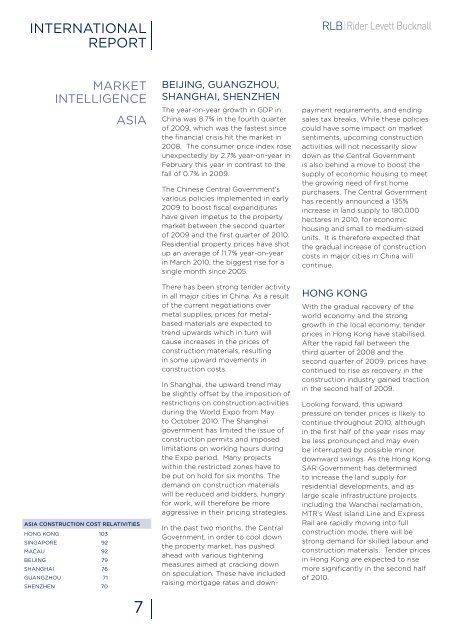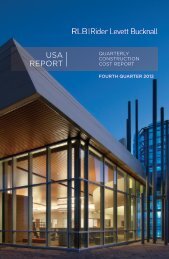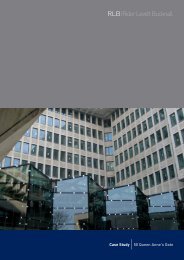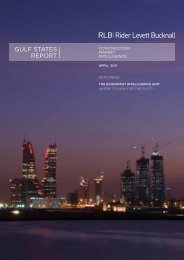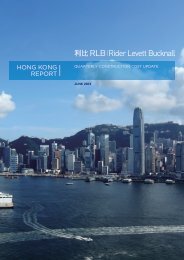Download... - Rider Levett Bucknall
Download... - Rider Levett Bucknall
Download... - Rider Levett Bucknall
Create successful ePaper yourself
Turn your PDF publications into a flip-book with our unique Google optimized e-Paper software.
INTERNATIONAL<br />
REPORT<br />
MARKET<br />
INTELLIGENCE<br />
ASIA<br />
Asia Construction Cost Relativities<br />
Hong Kong 103<br />
Singapore 92<br />
Macau 92<br />
Beijing 79<br />
Shanghai 76<br />
Guangzhou 71<br />
Shenzhen 70<br />
7<br />
Beijing, Guangzhou,<br />
Shanghai, Shenzhen<br />
The year-on-year growth in GDP in<br />
China was 8.7% in the fourth quarter<br />
of 2009, which was the fastest since<br />
the financial crisis hit the market in<br />
2008. The consumer price index rose<br />
unexpectedly by 2.7% year-on-year in<br />
February this year in contrast to the<br />
fall of 0.7% in 2009.<br />
The Chinese Central Government’s<br />
various policies implemented in early<br />
2009 to boost fiscal expenditures<br />
have given impetus to the property<br />
market between the second quarter<br />
of 2009 and the first quarter of 2010.<br />
Residential property prices have shot<br />
up an average of 11.7% year-on-year<br />
in March 2010, the biggest rise for a<br />
single month since 2005.<br />
There has been strong tender activity<br />
in all major cities in China. As a result<br />
of the current negotiations over<br />
metal supplies, prices for metalbased<br />
materials are expected to<br />
trend upwards which in turn will<br />
cause increases in the prices of<br />
construction materials, resulting<br />
in some upward movements in<br />
construction costs.<br />
In Shanghai, the upward trend may<br />
be slightly offset by the imposition of<br />
restrictions on construction activities<br />
during the World Expo from May<br />
to October 2010. The Shanghai<br />
government has limited the issue of<br />
construction permits and imposed<br />
limitations on working hours during<br />
the Expo period. Many projects<br />
within the restricted zones have to<br />
be put on hold for six months. The<br />
demand on construction materials<br />
will be reduced and bidders, hungry<br />
for work, will therefore be more<br />
aggressive in their pricing strategies.<br />
In the past two months, the Central<br />
Government, in order to cool down<br />
the property market, has pushed<br />
ahead with various tightening<br />
measures aimed at cracking down<br />
on speculation. These have included<br />
raising mortgage rates and down-<br />
payment requirements, and ending<br />
sales tax breaks. While these policies<br />
could have some impact on market<br />
sentiments, upcoming construction<br />
activities will not necessarily slow<br />
down as the Central Government<br />
is also behind a move to boost the<br />
supply of economic housing to meet<br />
the growing need of first home<br />
purchasers. The Central Government<br />
has recently announced a 135%<br />
increase in land supply to 180,000<br />
hectares in 2010, for economic<br />
housing and small to medium-sized<br />
units. It is therefore expected that<br />
the gradual increase of construction<br />
costs in major cities in China will<br />
continue.<br />
Hong Kong<br />
With the gradual recovery of the<br />
world economy and the strong<br />
growth in the local economy, tender<br />
prices in Hong Kong have stabilised.<br />
After the rapid fall between the<br />
third quarter of 2008 and the<br />
second quarter of 2009, prices have<br />
continued to rise as recovery in the<br />
construction industry gained traction<br />
in the second half of 2009.<br />
Looking forward, this upward<br />
pressure on tender prices is likely to<br />
continue throughout 2010, although<br />
in the first half of the year rises may<br />
be less pronounced and may even<br />
be interrupted by possible minor<br />
downward swings. As the Hong Kong<br />
SAR Government has determined<br />
to increase the land supply for<br />
residential developments, and as<br />
large scale infrastructure projects<br />
including the Wanchai reclamation,<br />
MTR’s West Island Line and Express<br />
Rail are rapidly moving into full<br />
construction mode, there will be<br />
strong demand for skilled labour and<br />
construction materials. Tender prices<br />
in Hong Kong are expected to rise<br />
more significantly in the second half<br />
of 2010.


